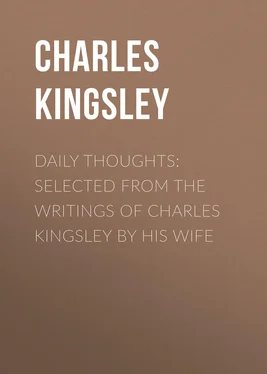Charles Kingsley - Daily Thoughts - selected from the writings of Charles Kingsley by his wife
Здесь есть возможность читать онлайн «Charles Kingsley - Daily Thoughts - selected from the writings of Charles Kingsley by his wife» — ознакомительный отрывок электронной книги совершенно бесплатно, а после прочтения отрывка купить полную версию. В некоторых случаях можно слушать аудио, скачать через торрент в формате fb2 и присутствует краткое содержание. Жанр: foreign_antique, Философия, foreign_edu, на английском языке. Описание произведения, (предисловие) а так же отзывы посетителей доступны на портале библиотеки ЛибКат.
- Название:Daily Thoughts: selected from the writings of Charles Kingsley by his wife
- Автор:
- Жанр:
- Год:неизвестен
- ISBN:нет данных
- Рейтинг книги:5 / 5. Голосов: 1
-
Избранное:Добавить в избранное
- Отзывы:
-
Ваша оценка:
- 100
- 1
- 2
- 3
- 4
- 5
Daily Thoughts: selected from the writings of Charles Kingsley by his wife: краткое содержание, описание и аннотация
Предлагаем к чтению аннотацию, описание, краткое содержание или предисловие (зависит от того, что написал сам автор книги «Daily Thoughts: selected from the writings of Charles Kingsley by his wife»). Если вы не нашли необходимую информацию о книге — напишите в комментариях, мы постараемся отыскать её.
Daily Thoughts: selected from the writings of Charles Kingsley by his wife — читать онлайн ознакомительный отрывок
Ниже представлен текст книги, разбитый по страницам. Система сохранения места последней прочитанной страницы, позволяет с удобством читать онлайн бесплатно книгу «Daily Thoughts: selected from the writings of Charles Kingsley by his wife», без необходимости каждый раз заново искать на чём Вы остановились. Поставьте закладку, и сможете в любой момент перейти на страницу, на которой закончили чтение.
Интервал:
Закладка:
Charles Kingsley
Daily Thoughts: selected from the writings of Charles Kingsley by his wife
This little Volume, selected from the MS. Note-books, Sermons and Private Letters, as well as from the published Works of my Husband, is dedicated to our children, and to all who feel the blessing of his influence on their daily life and thought.
F. E. K.July 10, 1884.
January
Welcome, wild North-easter!
Shame it is to see
Odes to every zephyr:
Ne’er a verse to thee.
. . . . .
Tired we are of summer,
Tired of gaudy glare,
Showers soft and steaming,
Hot and breathless air.
Tired of listless dreaming
Through the lazy day:
Jovial wind of winter
Turn us out to play!
Sweep the golden reed-beds;
Crisp the lazy dyke;
Hunger into madness
Every plunging pike.
Fill the lake with wild-fowl;
Fill the marsh with snipe;
While on dreary moorlands
Lonely curlew pipe.
Through the black fir forest
Thunder harsh and dry,
Shattering down the snow-flakes
Off the curdled sky.
. . . . .
Come; and strong within us
Stir the Viking’s blood;
Bracing brain and sinew:
Blow, thou wind of God!
1 1 The paper edition of this book has blank pages where the owner can write diary notes, etc. This is why the page numbers in the eText often miss out numbers.—DP.
Gather you, gather you, angels of God—
Freedom and Mercy and Truth;
Come! for the earth is grown coward and old;
Come down and renew us her youth.
Wisdom, Self-sacrifice, Daring, and Love,
Haste to the battlefield, stoop from above,
To the day of the Lord at hand!
Now, and at no other time: in this same nineteenth century lies our work. Let us thank God that we are here now, and joyfully try to understand where we are, and what our work is here . As for all superstitions about “the good old times,” and fancies that they belonged to God, while this age belongs only to man, blind chance, and the evil one, let us cast them from us as the suggestions of an evil lying spirit, as the natural parents of laziness, pedantry, fanaticism, and unbelief. And therefore let us not fear to ask the meaning of this present day, and of all its different voices—the pressing, noisy, complex present, where our workfield lies, the most intricate of all states of society, and of all schools of literature yet known.
Introductory Lecture, Queen’s College. 1848.Let us forward. God leads us. Though blind, shall we be afraid to follow? I do not see my way: I do not care to: but I know that He sees His way, and that I see Him.
Letters and Memories . 1848.Be good, sweet maid, and let who will be clever;
Do noble things, not dream them all day long;
And so make life, and death, and that For Ever
One grand sweet song.
Live in the present that you may be ready for the future.
MS.God demands not sentiment but justice . The Bible knows nothing of “the religious sentiments and emotions” whereof we hear so much talk nowadays. It speaks of Duty . “Beloved, if God so loved us, we ought to love one another.”
National Sermons . 1851.If thou art living a righteous and useful life, doing thy duty orderly and cheerfully where God has put thee, then thou in thy humble place art humbly copying the everlasting harmony and melody which is in heaven; the everlasting harmony and melody by which God made the world and all that therein is—and behold it was very good—in the day when the morning stars sang together and all the sons of God shouted for joy over the new-created earth, which God had made to be a pattern of His own perfection.
Good News of God Sermons . 1859.Fear not. Christ has the keys of death and hell. He has been through them and is alive for evermore. Christ is the first , and was loving and just and glorious and almighty before there was any death or hell. And Christ is the last , and will be loving and just and glorious and almighty as ever, in that great day when all enemies shall be under His feet, and death shall be destroyed, and death and hell shall be cast into the lake of fire.
MS. Sermon . 1857.Here and there, among rich and poor, there are those whose heart and flesh, whose conscience and whose intellect, cry out for the Living God, and will know no peace till they have found Him. For till then they can find no explanation of the three great human questions—Where am I? Whither am I going? What must I do?
Sermons on the Pentateuch . 1862.Of all the blessings which the study of Nature brings to the patient observer, let none, perhaps, be classed higher than this, that the farther he enters into those fairy gardens of life and birth, which Spenser saw and described in his great poem, the more he learns the awful and yet comfortable truth, that they do not belong to him, but to One greater, wiser, lovelier than he; and as he stands, silent with awe, amid the pomp of Nature’s ever-busy rest, hears as of old, The Word of the “Lord God walking among the trees of the garden in the cool of the day.”
Glaucus . 1855.Oh! Love! Love! Love! the same in peasant and in peer! The more honour to you, then, old Love, to be the same thing in this world which is common to peasant and to peer. They say that you are blind, a dreamer, an exaggerator—a liar, in short! They just know nothing about you, then. You will not see people as they seem—as they have become, no doubt; but why? Because you see them as they ought to be, and are in some deep way eternally, in the sight of Him who conceived and created them!
Two Years Ago , chap. xiv. 1856.We must live nobly to love nobly.
MS.Never was the young Abbot heard to speak harshly of any human being. “When thou hast tried in vain for seven years,” he used to say, “to convert a sinner, then only wilt thou have a right to suspect him of being a worse man than thyself.” That there is a seed of good in all men, a divine word and spirit striving with all men, a gospel and good news which would turn the hearts of all men, if abbots and priests could but preach it aright, was his favourite doctrine, and one which he used to defend, when at rare intervals he allowed himself to discuss any subject, from the writings of his favourite theologian, Clement of Alexandria.
Above all, Abbot Philamon stopped by stern rebuke any attempt to revile either heretics or heathens. “On the Catholic Church alone,” he used to say, “lies the blame of all heresy and unbelief; for if she were but for one day that which she ought to be, the world would be converted before nightfall.”
Hypatia , chap. xxx. 1852.Watch against any fallacies in your ideas which may arise, not from disingenuousness, but from allowing yourself in moments of feeling to think vaguely, and not to attach precise meaning to your words. Without any cold caution of expression, it is a duty we owe to God’s truth, and to our own happiness and the happiness of those around us, to think and speak as correctly as we can. Almost all heresy, schism, and misunderstandings, between either churches or individuals who ought to be one, have arisen from this fault of an involved and vague style of thought.
Читать дальшеИнтервал:
Закладка:
Похожие книги на «Daily Thoughts: selected from the writings of Charles Kingsley by his wife»
Представляем Вашему вниманию похожие книги на «Daily Thoughts: selected from the writings of Charles Kingsley by his wife» списком для выбора. Мы отобрали схожую по названию и смыслу литературу в надежде предоставить читателям больше вариантов отыскать новые, интересные, ещё непрочитанные произведения.
Обсуждение, отзывы о книге «Daily Thoughts: selected from the writings of Charles Kingsley by his wife» и просто собственные мнения читателей. Оставьте ваши комментарии, напишите, что Вы думаете о произведении, его смысле или главных героях. Укажите что конкретно понравилось, а что нет, и почему Вы так считаете.












